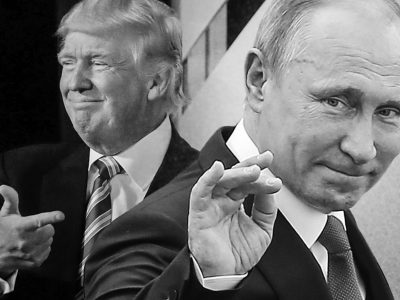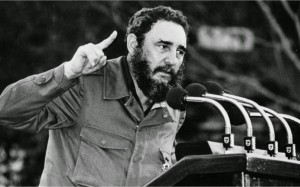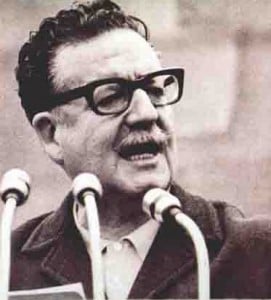Three Other Presidents Targeted for Befriending Russia

Note to readers: please click the share buttons above
In my article “Was Reagan a Traitor Too?,” I detailed how three U.S. presidents since World War II have been vilified and condemned for befriending Russia, America’s World War II partner and ally: John Kennedy, Ronald Reagan, and now Donald Trump.
However, they are not the only presidents who have been targeted by the U.S. national-security state for daring to befriend Russia. There are at least three others.
One was Jacobo Arbenz, the president of Guatemala, who was elected by the people of that country in a fair and free election. Arbenz was a socialist. That was one strike against him in the eyes of the U.S. national-security establishment. But what really cost him his position as president of Guatemala was his willingness to have friendly relations with the Soviet Union, the group of communist-run countries of which Russia was the principal member.

The year was 1954, when the Cold War that the U.S. deep state had been waging against Russia and “godless communism” since the end of World War II was in full swing. Any foreign leader who befriended Russia or any other communist state was automatically deemed an official enemy of the United States by the Pentagon, the CIA, and other elements of the U.S. government and labeled a threat to U.S. “national security.”
The CIA was assigned the task of getting rid of Arbenz, in one way or another. In the preparations for the operation, the CIA came up with an assassination list that listed the Guatemalan officials who were to be murdered. Americans are still not permitted to see who was on the list, but it is a virtual certainty that Arbenz was at the top. After all, he was the president. He was the one befriending Russia. It would make sense that he would be first to be murdered.
Arbenz was lucky, however. Realizing that his days as the democratically elected president of Guatemala were numbered, he escaped the country and preserved his life. The U.S. national-security establishment replaced him with a brutal, rightwing military general, a man who U.S. officials considered to be a “patriot.”
Another target was Fidel Castro, the president of Cuba, who successfully ousted from power the Cuban dictator Fulgencio Batista during the Cuban revolution in 1959. That was one strike against him because Batista was the U.S. government’s dictator in Cuba. Like Arbenz, Castro was a socialist. That was strike two. Strike three was the big one: Castro established friendly relations with Russia and the rest of the Soviet Union.
U.S. officials deemed Castro a threat to U.S. “national security” and targeted him for regime change. That is what the CIA’s paramilitary invasion at the Bay of Pigs in 1961 was all about. It’s what the CIA’s partnership with the Mafia was for — to develop ways to murder Castro. It’s what Operation Northwoods was all about. It was why the Pentagon and the CIA were exhorting President Kennedy to attack and invade Cuba during the Cuban Missile Crisis, notwithstanding the almost certain outcome of nuclear war with the Soviet Union. It is what the decades-long economic embargo against Cuba was all about.
It all came to naught. The U.S. deep state failed to oust Castro from power.
The third president was Salvador Allende, a Chilean physician who had been active in Chilean politics for a long time. In 1970 he won a plurality of votes in the national presidential election, notwithstanding the fact that the U.S. government had provided his opposition with millions of dollars in U.S. taxpayer money in the hopes of preventing Allende from winning. When the election was thrown into the Chilean parliament, U.S. officials then used U.S. taxpayer money in an attempt to bribe Chilean officials into voting against Allende.
All that U.S. meddling in Cuba’s presidential election came to naught. Allende won and was sworn into office as president.
Strike one was that Allende was a socialist. Strike two was his decision to befriend Cuba’s president Fidel Castro, even inviting him to visit Chile. Strike three was Allende’s decision to befriend Russia.
U.S. officials labeled Allende a threat to U.S. “national security.” The CIA was assigned the task of ousting him from power and replacing him with a pro-U.S. military general, just like what the CIA had done in Guatemala.
One big obstacle, however, was that the commanding general of the Chilean Armed Forces, Gen. Rene Schneider, said no to the U.S. demand for a coup. Schneider’s position was simple: the Chilean Constitution didn’t provide for a coup as a way to remove the nation’s democratically elected president. The only two methods to remove a president were impeachment and the next election, and impeachment had already failed.
That wasn’t the position of the Pentagon and the CIA. Their position was that the national-security establishment of a nation has the moral duty to remove a democratically elected president from office who is deemed to be a threat to “national security” (a position that has obvious ramifications in the assassination of President Kennedy).
U.S. officials conspired to kidnap and assassinate Schneider to remove him as an obstacle to the coup. The conspiracy was based in Washington, D.C., and Langley, Virginia. The CIA smuggled high-powered weapons into the country under diplomatic pouch and conspired with local thugs to kidnap Schneider. In the kidnapping attempt, Schneider, who was armed, fought back. The thugs shot him dead on the streets of Santiago. It was later determined that the CIA paid hush money to keep them quiet. When Schneider’s widow and children brought suit in U.S. federal court for the wrongful death of their husband and father, the federal judiciary summarily dismissed their suit.
With Schneider’s removal, U.S. officials convinced their counterparts in the Chilean national security establishment that they had the moral duty to remove their democratically elected president from office. On 9/11 in 1973, they did it. The national-security branch of the government attacked the executive branch with air force planes firing missiles at the president’s position in the national palace and with infantry troops surrounding him and shooting at him from the ground.
There has long been dispute over whether Allende was killed or committed suicide to avoid being taken prisoner and brutally tortured. In any event, he was soon dead and replaced by a brutal pro-U.S. military general, whose national-security state forces, with the full support of the U.S. national-security establishment, proceeded to round up, torture, disappear, rape, abuse, or execute tens of thousands of people who had supported their democratically elected socialist president.
Donald Trump should be counting his lucky stars. Being ousted from office by special counsel would really not be so bad given the other methods that the U.S. deep state has employed against presidents who have dared to befriend Russia.
*
This article was originally published on The Future of Freedom Foundation.
Jacob G. Hornberger is founder and president of The Future of Freedom Foundation. He was born and raised in Laredo, Texas, and received his B.A. in economics from Virginia Military Institute and his law degree from the University of Texas. He was a trial attorney for twelve years in Texas. He also was an adjunct professor at the University of Dallas, where he taught law and economics. In 1987, Mr. Hornberger left the practice of law to become director of programs at the Foundation for Economic Education. He has advanced freedom and free markets on talk-radio stations all across the country as well as on Fox News’ Neil Cavuto and Greta van Susteren shows and he appeared as a regular commentator on Judge Andrew Napolitano’s show Freedom Watch. View these interviews at LewRockwell.com and from Full Context. Send him email.



